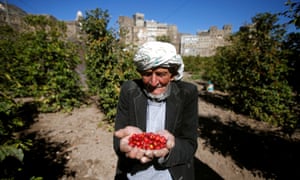Yemen - the birthplace of coffee
Haraz, a collection of
medieval villages in Yemen’s highlands, feels very far away from the
devastation of the country’s civil war. Banks of cloud tumble down green
farming terraces and caress the gingerbread-like houses clinging to the
mountainside, and the unique environmental conditions create some of the best
coffee in the world.


A farmer with freshly picked coffee cherries in Haraz. Photograph: Mohamed
Al-Sayaghi/Reuters
Yemen has exported
coffee since the 1400s: the Red Sea port of Mokha gives chocolatey coffee its
name. Although native to Ethiopia, the coffee plant was developed into the form
that gives us the modern beverage by Sufi monasteries in Yemen that shared it
with traders and pilgrims. Eventually, coffee made its way to Constantinople
(now Istanbul), Baghdad and London, leading to the rise of the coffee house.
Today the global
coffee industry is worth £61.4bn, making coffee the most valuable trading
commodity in the world after oil. Decades of political instability, however,
mean that the quality and availability of Yemeni beans has fluctuated – but now
a growing handful of dedicated farmers and exporters are determined to restore
Yemen’s reputation as the birthplace of black gold....
